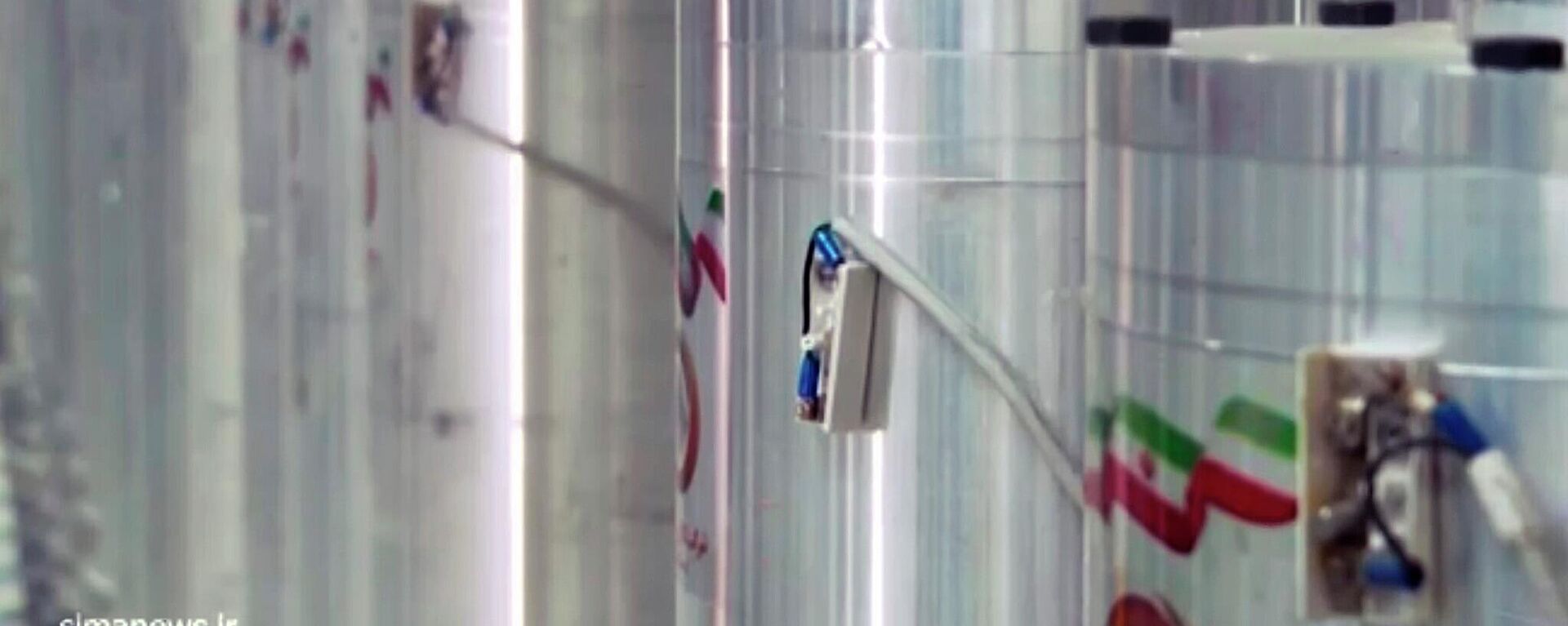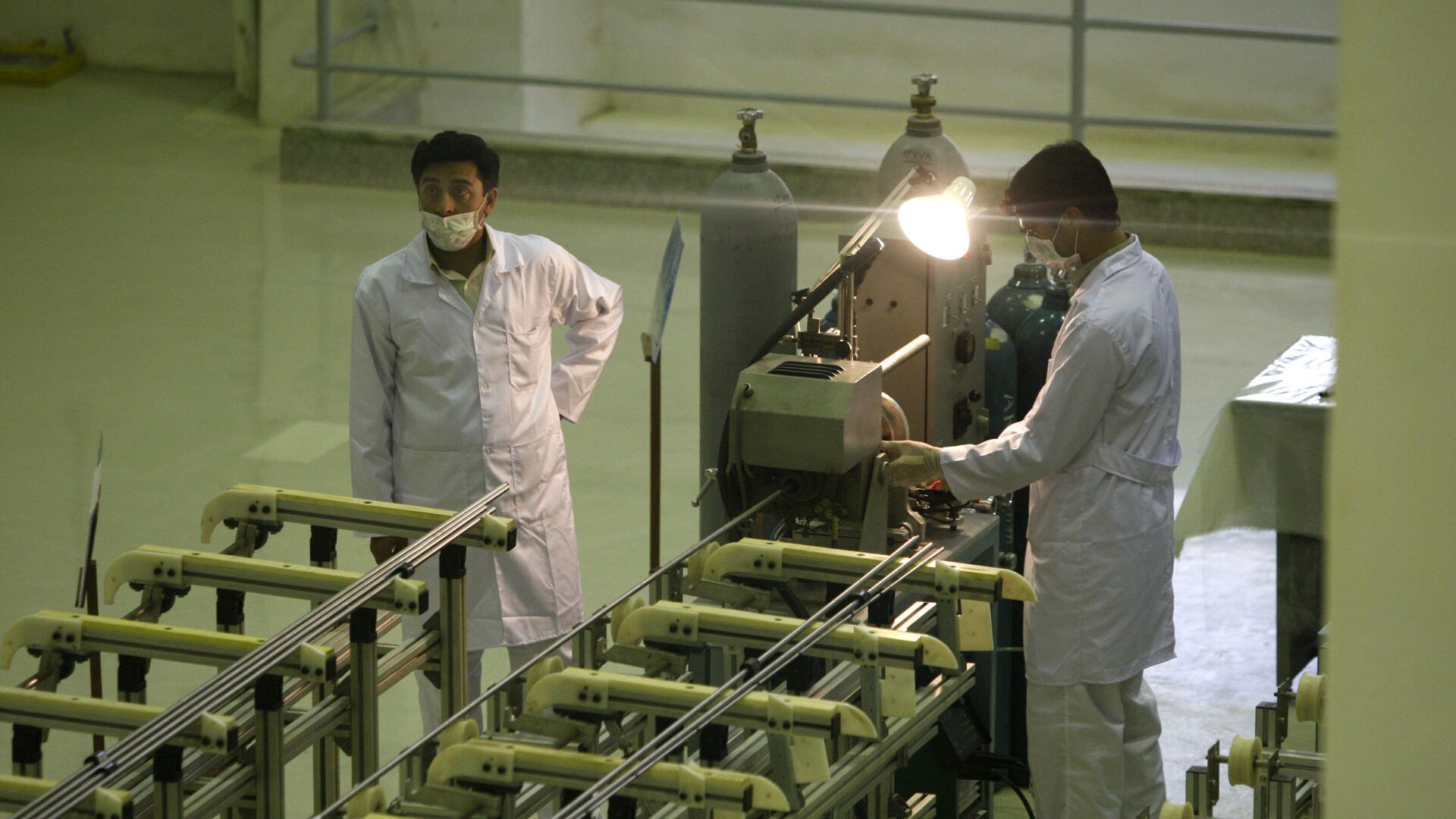https://sputnikglobe.com/20230226/cia-chief-claims-iran-has-made-no-decision-on-resumption-of-nuclear-weapon-program-1107811202.html
CIA Chief Claims Iran Has Made No Decision on Resumption of Nuclear Weapon Program
CIA Chief Claims Iran Has Made No Decision on Resumption of Nuclear Weapon Program
Sputnik International
WASHINGTON (Sputnik) - The United States does not think that Tehran is resuming its nuclear weapon program, US Central Intelligence Agency (CIA) chief William... 26.02.2023, Sputnik International
2023-02-26T05:15+0000
2023-02-26T05:15+0000
2023-02-26T05:15+0000
world
iran
us
nuclear program
iranian nuclear program
cia
https://cdn1.img.sputnikglobe.com/img/07e5/01/05/1081658219_0:0:3073:1728_1920x0_80_0_0_bc43623febe846250d6eccc5c01b4a0d.jpg
"We don't believe that the Supreme Leader in Iran has yet made a decision to resume the weaponization program that we judge that they suspended or stopped at the end of 2003," Burns said in an interview with a US broadcaster. Earlier this month, a US media outlet reported, citing senior diplomatic sources, that international atomic monitors in Iran had found uranium enriched to 84% of purity, which is the highest level detected by inspectors in the country so far and just 6% below what is needed for the production of nuclear weapons. In late January, International Atomic Energy Agency (IAEA) Director General Rafael Grossi said that Iran had failed to provide the IAEA with explanations on a number of issues. Grossi accused Tehran of violating agreements under the Joint Comprehensive Plan of Action (JCPOA). In 2015, Iran signed the JCPOA, also known as the Iran nuclear deal, with the P5+1 group of countries (the United States, China, France, Russia, the United Kingdom - plus Germany) and the European Union. It required Iran to scale back its nuclear program and severely downgrade its uranium reserves in exchange for sanctions relief, including lifting the arms embargo five years after the deal's adoption. In 2018, the US abandoned its conciliatory stance on Iran, withdrawing from the JCPOA and implementing hard-line policies against Tehran, prompting Iran to largely abandon its obligations under the accord. In April 2021, the parties to the agreement, together with the United States, began negotiations to restore the nuclear deal, working in Vienna. In December 2021, the JCPOA parties agreed on two drafts of a new deal, but there has been no final agreement. At the end of December, Iranian Foreign Ministry spokesman Nasser Kanaani said that the text of the revived deal was ready for signing, but Washington's "procrastination" was stopping the deal from being finalized.
https://sputnikglobe.com/20230116/iran-nuclear-deal-how-us-failed-historic-breakthrough--opened-door-to-seven-years-of-controversy-1106401574.html
iran
Sputnik International
feedback@sputniknews.com
+74956456601
MIA „Rossiya Segodnya“
2023
Sputnik International
feedback@sputniknews.com
+74956456601
MIA „Rossiya Segodnya“
News
en_EN
Sputnik International
feedback@sputniknews.com
+74956456601
MIA „Rossiya Segodnya“
Sputnik International
feedback@sputniknews.com
+74956456601
MIA „Rossiya Segodnya“
iran, us, nuclear program, iranian nuclear program, cia
iran, us, nuclear program, iranian nuclear program, cia
CIA Chief Claims Iran Has Made No Decision on Resumption of Nuclear Weapon Program
WASHINGTON (Sputnik) - The United States does not think that Tehran is resuming its nuclear weapon program, US Central Intelligence Agency (CIA) chief William Burns said.
"We don't believe that the Supreme Leader in Iran has yet made a decision to resume the weaponization program that we judge that they suspended or stopped at the end of 2003," Burns said in an interview with a US broadcaster.
Behrouz Kamalvandi, the spokesman of the Atomic Energy Organization of Iran, said on Monday that Western media reports saying that Tehran had allegedly enriched uranium to 84% distorted the reality as the country never went beyond the enrichment level of 60%.
Earlier this month, a US media outlet reported, citing senior diplomatic sources, that international atomic monitors in Iran had found uranium enriched to 84% of purity, which is the highest level detected by inspectors in the country so far and just 6% below what is needed for the production of nuclear weapons.
In late January, International Atomic Energy Agency (IAEA) Director General Rafael Grossi said that Iran had failed to provide the IAEA with explanations on a number of issues. Grossi accused Tehran of violating agreements under the Joint Comprehensive Plan of Action (JCPOA).

16 January 2023, 15:20 GMT
In 2015, Iran signed the JCPOA, also known as the Iran nuclear deal, with the P5+1 group of countries (the United States, China, France, Russia, the United Kingdom - plus Germany) and the European Union. It required Iran to scale back its nuclear program and severely downgrade its uranium reserves in exchange for sanctions relief, including lifting the arms embargo five years after the deal's adoption. In 2018, the US abandoned its conciliatory stance on Iran, withdrawing from the JCPOA and implementing hard-line policies against Tehran, prompting Iran to largely abandon its obligations under the accord.
In April 2021, the parties to the agreement, together with the United States, began negotiations to restore the nuclear deal, working in Vienna.
In December 2021, the JCPOA parties agreed on two drafts of a new deal, but there has been no final agreement. At the end of December, Iranian Foreign Ministry spokesman Nasser Kanaani said that the text of the revived deal was ready for signing, but Washington's "procrastination" was stopping the deal from being finalized.



